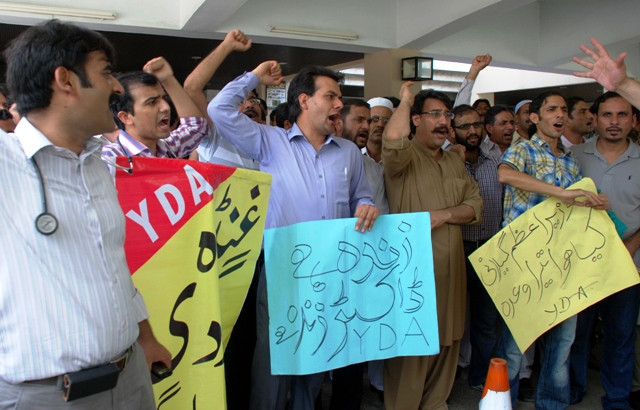Ever wondered if your doctor had a birthday party to attend? A valeema to go to? A bunch of kids at home wailing out in indignation because daddy hadn’t come home in time to take them to their favourite park? He would have, had he not received a call about a patient with a ruptured aneurysm.
As a doctor, I have never met a surgeon who, at some point during the surgical procedure, did not envy the person sleeping soundly on the operating table in front of him. Barely more awake than the patient he operates upon, his tired mind races through the personal troubles in his life.
Both my parents are doctors, which has made for an interesting childhood. If I had a penny for every school event my father missed, and every plan my mother had to cancel because of a patient going into labour, I’d have far more money than what the doctors are making today.
As a frustrated 9-year-old, I would sometimes stand at the door of my parents’ private nursing home in the evening, yelling at incoming patients that the hospital is closed. I knew mum and dad wouldn’t leave for that rare evening plan we had made weeks ago, until all the patients had been dealt with. Mom would call an off-duty nurse to watch over me and keep me entertained, while she continued to treat the sick way beyond her working hours.
And for what, I wonder? Irrespective of the freedoms we forfeit in honour of the oath we have taken, we’re still viewed as uncaring, avaricious vultures. We’ve been called murderers because of our inability to reverse death, or prevent it from happening entirely. Indeed, every patient who ever expired in the arms of a doctor, did so because of the doctor’s incompetence and never because of a natural process that was beyond his capacity to remediate.
In the hospital where I’ve been trained as a medical student, a doctor often calls security before informing a person about the death of his friend or relative. The second stage of grief, right after denial, is anger. That is never good for the doctor.
As the truth is never sensational enough, the media would have you believe that there are corpses piling up outside the hospitals as the doctors are refusing to treat any of the patients. That is not how it is. The emergency departments are still active, ready to handle all life-threatening cases with the same diligence as they always do. It is the outpatient departments that are being affected, if at all, by the protests.
When you perform a service, you expect to get paid for it; not doctors though. The idea is that the moment I raised my right hand to take the Hippocratic Oath, I simultaneously dumped my civil rights into a trash can. While lawyers, engineers, factory workers and all others are allowed to fight for higher salaries to compensate for inflation, and often succeed in their goals, doctors simply do not have this right. We're expected to work silently and ungrudgingly regardless of how little we are paid.
Doctors are demanding nothing that they have not already earned by running frantically from one ward to another, watching over your loved ones; spending Eid holidays standing by in the Emergency Rooms (ER); examining endless streams of patients through drooping eyelids.
It is neither our professionalism nor our patriotism that is waning; it is our energies that have been snuffed out. As dedicated as we are to helping our patients, we are simply too exhausted to do that as efficiently as we would like to.
If nobody else is willing to come out on the streets to fight for a doctor's rights, then regrettably, the doctor would have to leave the hospital and do it himself.
Read more by Faraz here or follow him on Twitter @FarazTalat
The doctor cannot see you today - he's tired
Are doctors expected to dump their civil rights in the trash the moment they take the Hippocratic Oath? No.



COMMENTS
Comments are moderated and generally will be posted if they are on-topic and not abusive.
For more information, please see our Comments FAQ